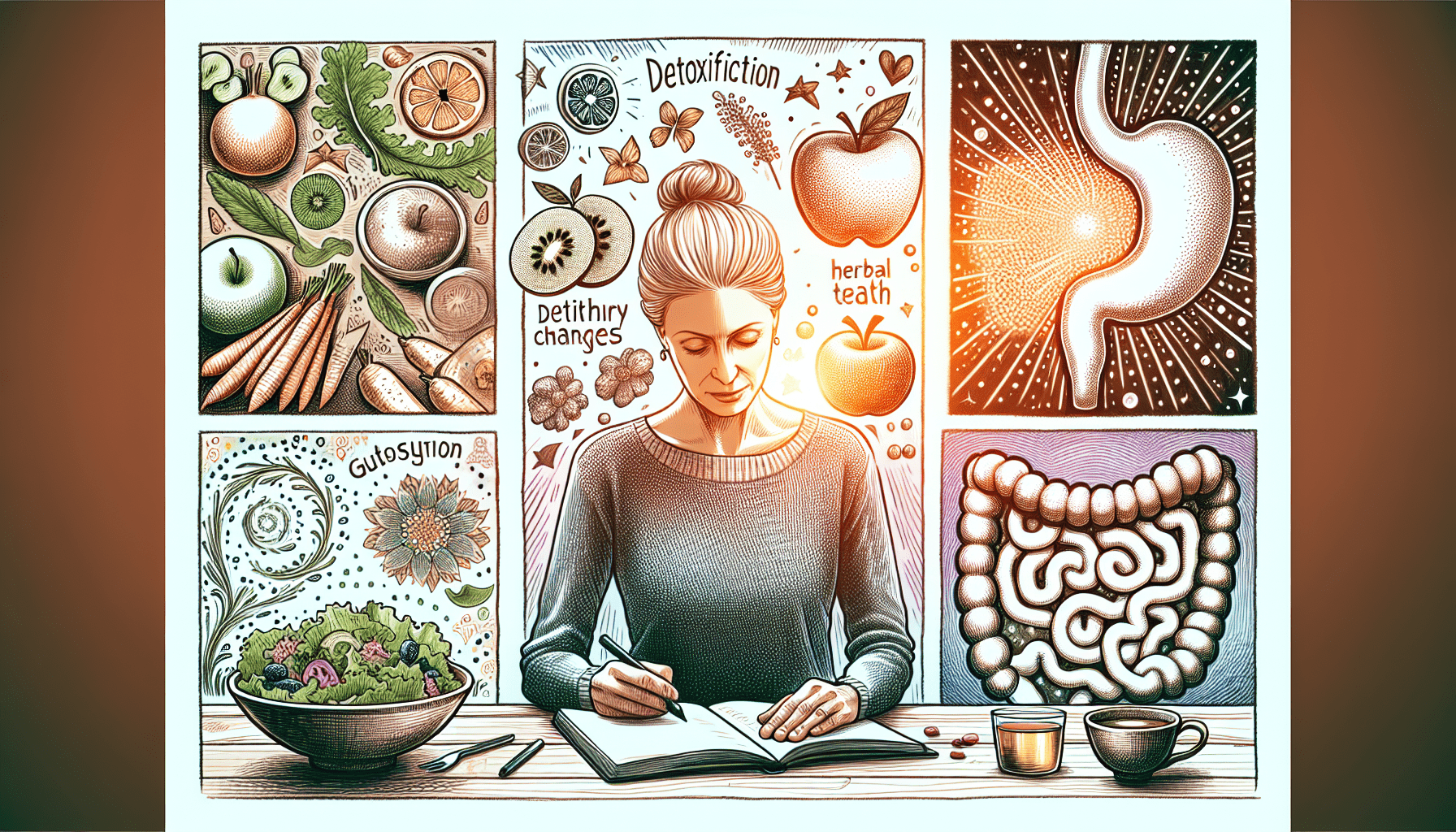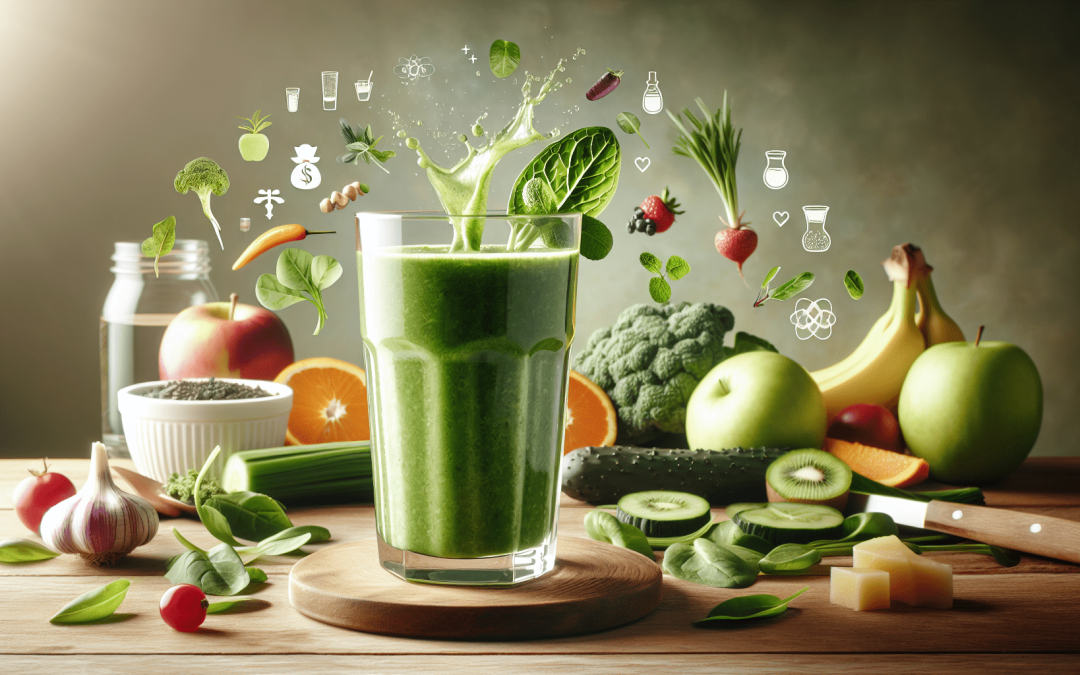Are you looking to improve your digestive health and overall well-being? Look no further than the power of gut detoxing. Detoxing your way to a healthier gut means nourishing and cleansing your intestines, which can lead to a myriad of benefits, including improved nutrient absorption, boosted energy levels, and enhanced immune function. By eliminating toxins and replenishing your gut with essential nutrients, you can restore balance to your digestive system and experience improved gut health. With a few simple and effective strategies, you can embark on a journey towards a healthier gut and a happier you.

Understanding the Gut and Its Importance
Introduction to the gut and its functions
The gut, also known as the gastrointestinal tract, is a complex system consisting of various organs and tissues that play a crucial role in our overall health. It starts from the mouth and goes all the way to the anus, encompassing the esophagus, stomach, small intestine, large intestine, and rectum.
The primary function of the gut is to digest and absorb nutrients from the food we eat. It breaks down carbohydrates, proteins, and fats into smaller molecules that can be easily absorbed by the body. Additionally, the gut is responsible for eliminating waste and toxins from our system, ensuring the proper functioning of our digestive system.
The role of the gut in overall health
Beyond digestion, the gut has a significant impact on our overall health and well-being. It is often referred to as our “second brain” due to the extensive network of nerves and neurons present in the gut. This connection between the gut and the brain, known as the gut-brain axis, plays a crucial role in regulating mood, emotions, and even cognitive function.
Furthermore, the gut is closely interconnected with our immune system. A significant portion of our immune cells resides in the gut, defending against harmful bacteria and viruses. A healthy gut contributes to a strong immune system, reducing the risk of infections and chronic diseases.
Common gut-related issues
Despite its importance, the gut is prone to various issues that can disrupt its optimal functioning. Some common gut-related issues include:
Digestive issues
Digestive issues such as bloating, gas, constipation, or diarrhea are often indications of an unhealthy gut. These symptoms may be caused by imbalances in gut bacteria, low fiber intake, or food intolerances.
Food sensitivities
Food sensitivities occur when the gut fails to properly break down certain foods, leading to adverse reactions such as inflammation, bloating, or skin problems. Identifying and addressing these sensitivities can significantly improve gut health.
Weakened immune system
If the gut is not functioning optimally, it can lead to a weakened immune system. This can make you more susceptible to infections, allergies, and autoimmune diseases.
Skin problems
Healthy skin is closely connected to a healthy gut. Imbalances in the gut microbiome can manifest as skin issues like acne, eczema, or dermatitis.
Mental health issues
The gut-brain axis plays a crucial role in mental health. Imbalances in gut bacteria or chronic inflammation in the gut can contribute to mood disorders like anxiety and depression.
Unexplained fatigue
Chronic fatigue without any apparent cause can often be linked to gut health. When the gut is not functioning optimally, nutrient absorption may be affected, leading to low energy levels.
What is Gut Detox?
Explanation of gut detoxification
Gut detoxification is the process of cleansing and optimizing the gut to promote overall health. It involves removing harmful toxins, supporting beneficial bacteria, and restoring the balance of the gut microbiome.
During a gut detox, various methods, such as dietary changes, supplementation, and lifestyle modifications, are employed to eliminate toxins, reduce inflammation, and improve gut function. The goal is to alleviate gut-related issues and enhance overall well-being.
How gut detox differs from other detox methods
Unlike general detox methods that focus on eliminating toxins from the entire body, gut detox specifically targets the digestive system. It involves supporting the gut’s natural detoxification processes and improving its function.
While other detox methods may involve fasting or drastic dietary restrictions, gut detox aims to provide the necessary nutrients for optimal gut health. It emphasizes on nourishing the gut with specific foods, nutrients, and lifestyle habits that promote healing and balance.
Benefits of gut detox
Engaging in a gut detox can provide numerous benefits for your overall health. Some of the key benefits include:
-
Improved digestion and nutrient absorption: By cleansing and optimizing the gut, you can enhance your digestive function and ensure proper absorption of nutrients from your food.
-
Enhanced immune system: A healthy gut supports a robust immune system, reducing the risk of infections and illnesses.
-
Increased energy levels: By eliminating toxins and restoring gut health, you may experience improved energy levels and reduced feelings of fatigue.
-
Weight management: A healthy gut contributes to a balanced metabolism, aiding in weight management and reducing the risk of obesity.
-
Mental well-being: The gut-brain connection means that a healthy gut can positively impact mental health, reducing symptoms of anxiety and depression.
-
Clearer skin: With an optimized gut, you may notice healthier, clearer skin, as imbalances in the gut microbiome can manifest in skin issues.
-
Reduced inflammation: Gut detox can alleviate chronic inflammation in the gut, which is often an underlying cause of various health issues.
By following a comprehensive gut detox program, you can reap these benefits and significantly improve your overall health and well-being.
Signs that Your Gut Needs Detoxification
Digestive issues
One of the most common signs that your gut is in need of detoxification is experiencing digestive issues. These include bloating, gas, indigestion, constipation, or diarrhea. If you often find yourself struggling with these symptoms, it may be an indication that your gut health needs attention.
Food sensitivities
Developing food sensitivities or intolerances can be a sign that your gut is not functioning optimally. If certain foods consistently cause adverse reactions, such as inflammation, bloating, or discomfort, it may be worth considering a gut detox.
Weakened immune system
If you frequently find yourself falling ill or having a weak immune response to infections, it may be a sign that your gut health is compromised. The gut plays a crucial role in supporting the immune system, so addressing any issues with the gut can boost your body’s defenses.
Skin problems
Skin problems, such as acne, eczema, or dermatitis, can often be linked to poor gut health. The gut-skin connection is well-established, and addressing gut issues through a detox can have a positive impact on your skin’s clarity and overall health.
Mental health issues
The gut-brain connection means that imbalances in the gut can contribute to mental health issues like anxiety, depression, or mood swings. If you are experiencing unexplained changes in your mental well-being, it may be worth considering a gut detox.
Unexplained fatigue
Chronic fatigue without any apparent cause can be a result of gut health issues. If you constantly feel tired despite adequate rest and sleep, detoxifying your gut may help improve your energy levels.
Natural Ways to Detox Your Gut
Dietary changes
The first step in detoxifying your gut is making dietary changes. Avoiding processed foods, refined sugars, and artificial additives can give your gut a break and reduce inflammation. Instead, focus on whole foods, including fruits, vegetables, lean proteins, and healthy fats.
Increase fiber intake
Fiber is essential for optimal gut health. It promotes regular bowel movements, reduces constipation, and feeds beneficial gut bacteria. Incorporate fiber-rich foods like whole grains, legumes, fruits, and vegetables into your diet.
Hydration
Staying hydrated is crucial for gut health and detoxification. Water helps flush out toxins from the body and keeps the digestive system functioning smoothly. Aim to drink at least 8 glasses of water per day, and consume water-rich foods like cucumbers, melons, and citrus fruits.

Probiotics and fermented foods
Probiotics are beneficial bacteria that support gut health. Including probiotic-rich foods like yogurt, kefir, sauerkraut, or kimchi in your diet can improve the balance of gut flora. Additionally, fermented foods are rich in enzymes and nutrients that aid in digestion.
Reducing stress
Chronic stress can negatively impact gut health. Incorporating stress-reducing techniques into your daily routine, such as meditation, yoga, or deep breathing exercises, can help support a healthy gut.
Regular exercise
Exercise not only promotes overall health but also aids in gut detoxification. Physical activity stimulates digestion, enhances blood flow to the gut, and supports the elimination of toxins. Aim for at least 30 minutes of moderate-intensity exercise most days of the week.
Limiting alcohol and caffeine consumption
Alcohol and excessive caffeine intake can disrupt gut health. These substances can irritate the lining of the gut and negatively impact beneficial gut bacteria. Limit your consumption of alcohol and caffeine for optimal gut detoxification.
Getting enough sleep
Adequate sleep is crucial for restoring and healing the body, including the gut. Aim for 7-9 hours of quality sleep each night to support optimal gut health and detoxification.
Detoxifying Foods for a Healthier Gut
Cruciferous vegetables
Cruciferous vegetables like broccoli, cauliflower, cabbage, and Brussels sprouts are rich in sulfur compounds that support liver detoxification. These veggies also provide a good amount of fiber, aiding in gut cleansing.
Leafy greens
Leafy greens such as spinach, kale, and Swiss chard are packed with vitamins, minerals, and antioxidants that promote gut health. They also provide chlorophyll, which can support the elimination of toxins from the body.

Fiber-rich foods
As mentioned earlier, fiber is crucial for a healthy gut. Incorporate fiber-rich foods like beans, lentils, whole grains, and chia seeds into your diet to support gut detoxification.
Berries and fruits
Berries and fruits are not only delicious but also beneficial for gut health. They contain antioxidants and fiber, which can improve digestion, reduce inflammation, and support the growth of beneficial gut bacteria.
Healthy fats
Include healthy fats like avocados, nuts, and seeds in your diet to support gut health. These fats provide essential nutrients and help reduce inflammation in the gut.
Bone broth
Bone broth is rich in collagen, amino acids, and minerals that can help heal and seal the gut lining. It also supports the growth of beneficial gut bacteria, aiding in gut detoxification.
Fermented foods
Fermented foods like yogurt, kefir, sauerkraut, and kombucha are packed with probiotics that support a healthy gut. Incorporate these foods into your diet to boost beneficial bacteria in the gut.
Herbs and spices
Certain herbs and spices, such as ginger, turmeric, garlic, and oregano, have antimicrobial and anti-inflammatory properties that can benefit gut health. Include these flavorful ingredients in your cooking to enhance gut detoxification.
Supplements for Gut Detoxification
Probiotics
Probiotic supplements can help replenish beneficial gut bacteria, especially if you have an imbalance or need to restore gut health. Look for a high-quality probiotic with a variety of strains.

Prebiotics
Prebiotics are fibers that feed beneficial gut bacteria. Taking a prebiotic supplement or consuming prebiotic-rich foods like onions, garlic, and bananas can support gut health and detoxification.
Digestive enzymes
Digestive enzyme supplements can aid in the breakdown and absorption of nutrients, promoting optimal gut function. Consider taking digestive enzyme supplements if you have digestive issues or need additional support during gut detoxification.
Vitamin D
Vitamin D deficiency has been linked to gut health issues. Talk to your healthcare provider about whether vitamin D supplementation is appropriate for you, especially if you live in a region with limited sunlight exposure.
Fish oil
Fish oil supplements, rich in omega-3 fatty acids, can have anti-inflammatory effects on the gut. Consider incorporating fish oil into your supplement routine to support gut health.
Precautions and Considerations for Gut Detox
Consulting a healthcare professional
Before embarking on a gut detox, it is always advisable to consult with a healthcare professional or a registered dietitian. They can assess your individual needs, provide personalized guidance, and ensure that a detox is appropriate for you.
Gradual detoxification
A sudden and drastic detoxification can overwhelm the body and potentially cause adverse effects. It is essential to approach gut detoxification gradually, allowing your body to adjust and adapt to the changes.
Avoiding extreme diets
Extreme diets that severely restrict calories or eliminate entire food groups can be detrimental to gut health. Opt for a balanced and nourishing approach to gut detoxification instead.

Managing detox symptoms
During a gut detox, you may experience some detox symptoms as your body adjusts. These can include headaches, fatigue, or changes in bowel movements. Staying hydrated, getting plenty of rest, and practicing self-care can help manage these symptoms.
Ensuring a balanced nutrient intake
While focusing on gut detoxification, it is crucial to ensure you are consuming a balanced and varied diet that provides all essential nutrients. Incorporate a wide range of foods to support overall health and well-being.
Importance of Hydration in Gut Detox
Role of water in detoxification
Hydration is essential for effective gut detoxification. Water plays a key role in flushing out toxins from the body, aiding digestion, and maintaining the overall balance of bodily functions. It helps transport nutrients, eliminate waste, and lubricate the digestive system.
Recommended daily water intake
To support gut health and detoxification, it is recommended to drink at least eight glasses of water per day. However, individual water needs may vary depending on factors such as age, activity level, climate, and overall health. Listen to your body’s thirst cues and drink water throughout the day to stay adequately hydrated.
Water-rich foods for hydration
In addition to drinking water, you can also increase your hydration levels by consuming water-rich foods. Fruits and vegetables like cucumbers, watermelon, oranges, and lettuce have high water content, which contributes to both hydration and gut health. Including these foods in your diet can help support your gut detoxification efforts.
The Role of Exercise in Gut Health
How exercise aids in gut detoxification
Regular exercise plays a crucial role in maintaining a healthy gut and aiding in detoxification. Physical activity stimulates the muscles in the digestive system, promoting efficient movement of food through the gut. It also increases blood flow to the intestines, providing oxygen and nutrients for optimal gut function. Additionally, exercise can help reduce stress, which can have a positive impact on the gut.
Best exercises for gut health
While any form of exercise can be beneficial for gut health, certain types of exercise may offer specific advantages. Aerobic exercises like jogging, swimming, or cycling increase blood flow to the gut and promote overall gut motility. Strength training exercises, such as weightlifting or resistance training, can help maintain muscle tone in the abdominal area, supporting healthy digestion.
Duration and frequency of exercise
To support gut detoxification, aim for at least 30 minutes of moderate-intensity exercise most days of the week. However, listen to your body and adjust the duration and intensity based on your fitness level and any underlying health conditions. It is essential to find a balance that works for you and supports your gut health goals.
Lifestyle Changes for Maintaining a Healthy Gut
Reducing stress
Chronic stress can negatively impact gut health. Implement stress-reducing techniques into your daily routine, such as mindfulness meditation, deep breathing exercises, or engaging in hobbies that bring you joy and relaxation.
Getting quality sleep
Adequate sleep is crucial for gut health. Aim for 7-9 hours of quality sleep each night to support optimal gut function and overall well-being.
Avoiding unnecessary antibiotic use
Antibiotics can disrupt the natural balance of gut bacteria. Only use antibiotics when necessary and follow the prescribed course of treatment to minimize their impact on gut health.
Limiting exposure to toxins
Toxins from pollutants, pesticides, and chemicals can negatively affect the gut. Minimize exposure to toxins by choosing organic produce, using clean household products, and avoiding unnecessary exposure to environmental pollutants.
Eating mindfully
Practicing mindful eating can support gut health. Chew your food thoroughly, eat slowly, and pay attention to your body’s hunger and fullness cues. Avoid overeating and allow yourself to savor and enjoy your meals.
Regular check-ups and monitoring
Regular check-ups with your healthcare provider allow for early detection and management of gut health issues. Monitoring your gut health through routine examinations, tests, and screenings can help maintain and promote a healthy gut.
In conclusion, understanding the gut and its importance is vital for optimizing overall health. Gut detoxification offers a holistic approach to improving gut health, alleviating digestive issues, and supporting overall well-being. By making dietary changes, incorporating detoxifying foods, taking appropriate supplements, and adopting lifestyle modifications, you can effectively detox your gut and promote a healthier digestive system. Remember to consult with a healthcare professional before starting any detox program and ensure a gradual and balanced approach to support long-term gut health. With proper care and attention, you can reap the benefits of a healthy gut and enjoy a happier, more vibrant life.









